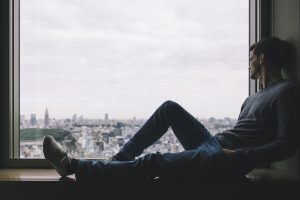Social distancing has become a new way of life in recent weeks to prevent the spread of COVID-19, but some may have a tougher time than others adjusting to staying at home and away from family and friends.
 Dr. Crystal Dillard, psychology clinic director at UA, recently discussed ways to cope with social distancing if you start to feel anxious during this time.
Dr. Crystal Dillard, psychology clinic director at UA, recently discussed ways to cope with social distancing if you start to feel anxious during this time.
How common is it for social distancing to lead to anxiety?
The term “social distancing” is really a misnomer. It’s actually physical distancing, while social interaction (albeit virtually) should continue, and can be a useful coping strategy during crises like this one. Most of us already use technology for social purposes in our daily lives, so people will likely continue using things like Facetime or social media apps.
It’s also a good idea to put down the technology sometimes and simply reach out to someone for a “good ‘ol fashioned” phone call. Whatever their preference, it is especially important for people to continue connecting to and reaching out to one another (virtually, that is) during this stressful time.
Are extroverted people more likely to feel anxious when social distancing, or is anxiety a normal reaction to physical isolation?
This is an unprecedented event that is likely to contribute to stress and anxiety for many people, regardless of their interpersonal style. Anxiety is a typical response to crisis situations in general, including the coronavirus outbreak. There are a lot of unanswered questions for people right now and not being able to plan for things can raise stress levels. For individuals already managing daily anxiety or depression prior to the outbreak, they may experience a heightened level of symptoms in response to the pandemic.
It’s essential that people pay attention to their emotional and physical health and take time to assess how they are doing. Talking to others regularly helps us to stay connected, but also gives others a chance to see how we are doing and give us feedback and helps us realize that many of us are having very similar reactions.
What are some of the emotions one would feel when they are experiencing anxiety due to feeling isolated?
Anxiety is often thought of as feelings of nervousness and apprehension, or difficulty controlling worries. However, emotional difficulties can also show up as physical symptoms, like sleeplessness, restlessness, headaches and fatigue, gastrointestinal complaints, or more severe episodes that include shakiness, dizziness, racing heart and feeling short of breath. People might also feel like they are having difficulty regulating their emotions or experiencing a number of different emotions in a short period of time.
What are some tools or coping mechanisms people can use if they start to feel isolated?
First, turn off the news. While it’s important to stay informed, it helps to set a limit for how many times a day you will access news information about the outbreak since repeated online checking can increase anxiety. When you do access information, make sure it’s from a reputable source. Also, while some social media content (e.g., memes) may provide humor – and humor and laughter are excellent for combating stress – consider taking a social media break when coronavirus content starts to feel overwhelming.
Next, self-care is essential. I’ve always been an advocate of self-care, not just for the clients or patients I’ve worked with, but also for myself, staff, trainees, family and friends. Self-care looks different for everyone. If possible, it’s good to have a routine and try to add some structure to your daily schedule. Routine can reduce anxiety.
In addition to structuring your day, it’s important to aim for eight hours of sleep each night and add good nutrition to your daily diet. Other things that help include mindfulness and relaxation training. While these strategies can be effectively taught in psychotherapy, there are many reputable online resources and apps available to the public for practicing relaxation and mindfulness, and you can practice for a few minutes every day. Exercise is another key stress reliever and research indicates it has a powerful impact on mood and brain functioning.
What are some UA resources students, faculty and staff can use during this time if they are feeling isolated?
While the UA Psychology Clinic is currently operating on a limited basis and is not open for in-person sessions, our website (https://psychologyclinic.ua.edu) lists local and national resources under a special tab dedicated to COVID-19. This includes contact information for local resources (DCH North Harbor Pavilion and Indian Rivers Behavioral Health), and national resources, such as the National Suicide Prevention Lifeline (1-800-273-TALK), and the Crisis Text Line (text HOME or CONNECT to 741741).
For UA students, the Counseling Center has a crisis text line that students can connect with by texting BAMA to 741741. As always, emergencies should be managed by calling 911, or UAPD at 205-348-5454.
